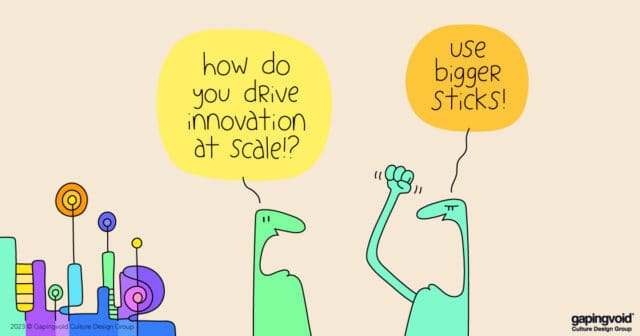Seth Godin does it.
Brian Clark does it.
Gary Vee does it.
Esther Dyson does it.
James Governor does it.
Kathy Sierra does it.
Dennis Howlettt does it.
John T. Unger does it.
Robert Scoble does it.
Fred Wilson does it.
These eight smart, kind, great people, some more well-known than others, are masters at what I call “Selling by Giving”.
They put stuff out there, as gifts. Great content, great ideas, great insights, great personal connection. By giving so much of themselves, for free, every day, they build up huge surpluses of goodwill, so when you’re finally in the market for something they’re selling (and they’re ALL selling something, trust me), they’re first on your list.
I do it, too, just not as well as these guys. I’ve published thousands of cartoons on this blog over the years, and that’s gotten me a lot of business. And not just fine art prints, either. It’s gotten me consulting gigs, full-time salary jobs, book deals, paid speaking gigs, marketing jobs, I could go on…
Selling by giving. Anybody who’s been watching any of these guys for a long time will know exactly what I’m talking about.
But here’s what’s interesting to me: I can remember not that long ago, say 5 years, when this type of marketing seemed pretty freaky to most people. Now it’s considered normal, at least to smart marketers. FIVE years. That’s all.
I could see that in another five years, ANYONE who wants to market ANYTHING successfully- be they small mom n’ pop shops to large companies, will have to be fluent in Gift Economics, to a level that seemed COMPLETELY alien only a few years ago.
This includes you. Are you ready for it?
[About Hugh. Cartoon Archive. Commission Hugh. Sign up for Hugh’s “Daily Cartoon” Newsletter.]




